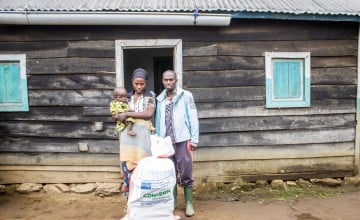
Read our 2024 annual report

Knowledge Hub
Concern supports thousands of displaced people in Democratic Republic of Congo

Concern is responding to meet the immediate needs of almost 29,000 people who have been forced by conflict to flee their homes in eastern Democratic Republic of Congo.
Over the last eight months, Concern’s team in north Kivu has worked as part of an EU-funded response by a consortium of non-government organisations, to provide essential needs such as health and nutrition, water and sanitation, and protection to displaced people in Masisi territory and North Kivu province.
As a result of decades of conflict, DRC is experiencing the third largest displacement crisis in the world – after Sudan and Syria. The country is also one of the world’s poorest, with the UN estimating that 21.2 million people – one in five of the population – will need humanitarian assistance this year.
There are currently 6.9 million people displaced in DRC – with the vast majority of these in the east of the country, having fled their homes to escape conflict.
An escalation in the conflict in January this year resulted in over 100,000 people being forced from their homes over a three-day period, in the region where the consortium was working.
Humanitarian needs
This resulted in an unprecedented rise in humanitarian need with cholera outbreaks in a number of locations, a sharp rise in the need for food and non-food items, limited access to basic social services, and alarming levels of protection needs, especially for women, children and people with disabilities.
With EU funding, Concern worked with Première Urgence Internationale (PUI) and War Child to implement an integrated response to meet the immediate needs of people being hosted by local communities.
Health and Nutrition
“The consortium provided free primary health care for the target population as well as support for emergency medical referral systems, disease prevention awareness raising, and response capacity for epidemics such as cholera,” Concern’s Country Director Mougabé Koslengar said. “We provided primary care consultations for over 5,700 people for childhood illnesses, sexual and reproductive health care, and medical treatment for gender-based violence.”
Severely malnourished children were provided with free access to quality treatment. Community leaders were trained to provide community-level awareness sessions on good health, nutrition, and hygiene practices.
Water and sanitation
The provision of clean water and sanitation are key needs for displaced people and with the arrival of large numbers of people into host communities, especially to reduce the risk of water-borne diseases. Concern led on this element of the programme, constructing 150 latrines and 75 family showers, and five rubbish pits.
Two community water supply systems were rehabilitated to provide improved drinking water for 12,000 people. At the same time, local management committees were trained and equipped with maintenance toolkits to ensure the sustainability of this infrastructure.
They also distributed essential household hygiene kits (containing items such as soap, detergent and buckets) to 6,500 people.
Protection
The consortium has provided essential supports to some of the most vulnerable people displaced. These included community-based mental health services and psychosocial support for almost 2,700 children and adults.
The protection programme also placed 36 unaccompanied and/or separated children with temporary foster families. To date, 21 of these have since been reunited with their biological families.
Specialised care was provided for survivors of gender-based violence.
Ancila and Rafiki's story
Ancila Niyonzima, her husband Rafiki Dukuze and their four children, are among those who participated in the integrated programme of supports. They sought refuge in Buguri four years ago after armed groups arrived in their own village.
They found it difficult to earn a living in their new location. “Sometimes, our children went to bed without eating. We had food with no nutritional value, and our youngest son, Israel (15 months), often refused to eat. He eventually became ill and was diagnosed with acute malnutrition,” Rafiki explained.
Community workers, employed as part of the programme, detected the signs of acute malnutrition and referred the child to the local health centre run by PUI. He received care and therapeutic food. “He is slowly regaining his appetite. The doctors reassured me that his health is improving. That brings me great relief,” Ancila said.
In July 2025, to support recovery and prevent relapse, Concern distributed hygiene kits to the family. “My wife explained to me that poor hygiene can worsen malnutrition. But with our financial situation, I could never have bought these kits myself. I’m truly grateful for the buckets and soap – they were a real need for our family,” Rafiki said.
For media queries contact Eamon Timmins, Media Relations Manager, Concern Worldwide, at eamon.timmins@concern.net or at 00 353 87 9880524
Other ways to help
Corporate support
Is your company interested in working together for a common cause?
Fundraise for Concern
From mountain trekking to marathon running, cake sales to table quizzes, there are lots of ways you can support our work.
Buy a gift
With an extensive range of alternative gifts, we have something to suit everybody.
Leave a gift in your will
Leave the world a better place with a life-changing legacy.
Volunteer with Concern
The lots of ways to get involved with our work as a volunteer
School fundraising
Without the generous support from schools, we wouldn't be able to do the work that we do.

